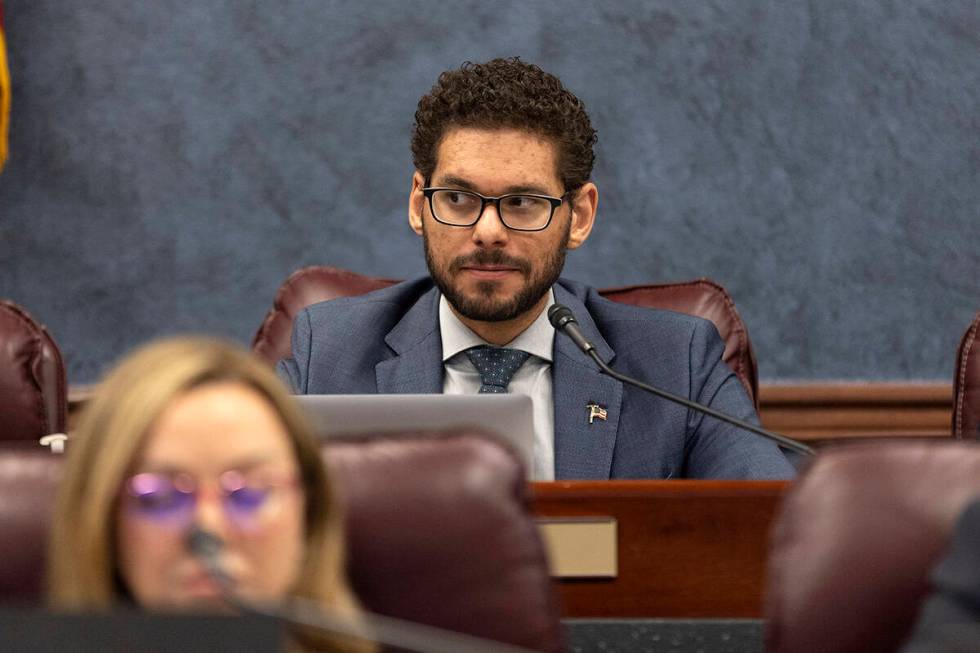NV Energy opposes proposed energy bill, says it doesn’t go far enough

A bill that calls on NV Energy to boost in-state electric generation received a mixed public reaction Tuesday during a nearly three-hour legislative hearing, including pushback from the utility.
Assemblyman Howard Watts, D-Las Vegas, the sponsor of Assembly Bill 524, presented it as a compromise that would spur more electric resource development without having the Legislature mandate that certain electric resource proposals be approved by the Public Utilities Commission.
“What we want is to have public policy that ensures that we’re addressing issues of reliability, that we’re addressing issues of affordability and that we are continuing to develop clean energy resources,” Watts told a joint hearing of the Assembly and Senate Committees on Growth and Infrastructure.
Among other things, the bill would change the way electric utilities propose adding resources to their energy supply and get approval from the PUC, including how the utility can reduce its reliance on the expensive open energy market.
NV Energy, which previously withheld comments on the legislation, said in the hearing that it opposes the bill, saying it doesn’t go far enough in directing the utility on how it should reduce its reliance on the energy open market.
“Nevada needs a bold policy directive that increases our in-state generation resources, ramps up renewable energy projects with federal funding,” said Janet Wells, the vice president of regulatory affairs for NV Energy. “(AB 524) simply does not provide any clear direction to solve these real problems that are faced by Nevada.”
The company said it would prefer the Legislature mandate which projects NV Energy should undertake.
“This is more about the state indicating that there should be a very strong policy statement and a policy pronouncement by the Legislature — which is the Legislature’s role — indicating that the open position that we currently have, which is 30 percent of our energy in the summertime … needs to be closed and closed quickly,” said Tony Sanchez, the executive vice president of business development and external relations at NV Energy.
In 2021, the Legislature passed an omnibus energy bill that gave NV Energy clear directions to accelerate the development of the $2.5 billion Greenlink Nevada transmission project and directed the company to propose transportation electrification plans, which have received $170 million in approved spending.
Creating legislative mandates for electric projects to be approved by the PUC can greatly reduce the ability of state regulators to properly vet those projects, according to Ernest Figueroa, Nevada’s Consumer Advocate.
“It is akin to putting the thumbs on the scales of justice, tying the hands of the (PUC), and tying my hands preventing me from making arguments to protect the ratepayers at the (PUC),” he said.
Figueroa officially took a neutral position on Watts’ bill.
The Latin Chamber of Commerce and the Las Vegas Asian Chamber of Commerce voiced similar concerns that AB 524 doesn’t do enough. The International Brotherhood of Electrical Workers, the AFL-CIO and the Culinary Union also opposed the bill, stating they wanted more guarantees that new energy projects would be located in the state and would provide good paying jobs.
But the bill did receive widespread support from different advocacy groups, including the Nevada Conservation League, Mormon Women for Ethical Government and the Nevada Resort Association who said it would add transparency to the planning process. It also received support from several business organizations including Google, MGM Resorts International, Caesars Entertainment Inc. and Boyd Gaming Corp.
“This legislation advances the process of long term planning for electricity by making it easier for customers and other stakeholders to weigh in on plans that NV Energy brings forward and gives the PUC the appropriate oversight over their approval,” said Michael Hillerby, on behalf of Google.
The joint committee didn’t vote on the bill. Since the last day of the Legislative session is June 5, the bill has just under a week to get passed. Watts acknowledged that changes to the bill could still happen as conversations around it are “ongoing.”
“I want to make sure that whatever moves forward is balanced and provides the utility regulator with the ability to ensure these projects are in the best interest of the customer,” Watts said in a text message.
Contact Sean Hemmersmeier at shemmersmeier@reviewjournal.com. Follow @seanhemmers34 on Twitter.